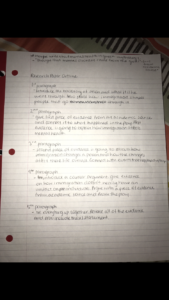Federico Bardier
Professor Jay Polish
ENG102
Trauma during the migration process and the responsibility towards refugees and undocumented migrants
Political turmoil, violence, discrimination and economic hardship are some of the main reasons why people are forced to flee their countries of origin in search for a safer environment to go on with their lives and provide for their families. The United States is one of the main destinations for refugees and undocumented migrants in the world. According to the Pew Research Center, “about 3 million refugees have been resettled in the U.S. since Congress passed the Refugee Act of 1980, which created the Federal Refugee Resettlement Program and the current national standard for the screening and admission of refugees into the country (np)”. But the country faces its own challenges when it comes to dealing with the results of circumstances that may have originated far from U.S. soil. In many cases, the journey itself represents a grave danger for the migrant and would be refugee.
Anon(ymous) is a play written by Naomi Izuka, a Japanese-Latina-American and an immigrant herself. They play deals with the various obstacles that Anon, a refugee from an undetermined country, has to deal with in the way to and after his arrival to the U.S. Displacement, harassment, objectification and discrimination are some of the main hurdles faced by Anon once he arrives to the country, but they trauma born out of his apparent near death experience extends throughout the entire play, defining his entire experience. It also mirrors the experience of a large number of migrants and refugees while they try to get to the U.S.
According to Section 94(1) of the Immigration and Asylum Act of the United Nations Agency for Refugees, an asylum seeker is a displaced person who “…is not under 18 and has made a claim for asylum which has been recorded by the Secretary of State but which has not been determined”. We know that Anon belongs to this group, as Helen Laius tells to Nemasani, together with her husband, they adopted a “little boy the third world” that “the senator found in a refugee camp” (Izuka 15).
War, political turmoil, persecution, discrimination and political instability are some of the main vectors that drive would be refugees and undocumented migrants to seek refuge in the “developed” world and more stable regions of the world. The causes of their flight alone are enough to generate considerable trauma to the migrants who choose or decide to leave. Family, friends and most of their material possessions are left behind with the uncertain promise of a better life and the opportunity to provide for those left behind, and this can also be a source of considerable conflict. “During the migration period, refugees often move between different countries and different refugee camps. By this time, they are typically separated from their families and friends, creating intense anxiety and depression as they realize all they have lost” (George 2). Oftentimes, after arrival, a number of migrants can’t adapt or are not given the opportunity to integrate to their new environment and are stigmatized by a society that rejects anything different than a Eurocentric notion of values, beliefs and physical appearance.
“Studies of refugee youth consistently report high levels of exposure to war-related trauma and profound adverse consequences of these experiences for children’s mental health, including behavior problems, mood and anxiety disorders, posttraumatic stress disorder (PTSD), and a range of other adjustment difficulties” (Betancourt, et al 1).
In Izuka’s play, Anon leaves his country in order to escape an armed conflict that threatens his and his mother’s life. “Where I come from there was a war that lasted so long people forgot what they were fighting for. Where I come from bombs rained down from the sky night after night and boys wandered the streets with M16s” (Izuka 4). Once he is in the U.S. he suffers a different kind of violence. Nemasani (his mother) is also a victim, as she is discriminated and a victim of sexual coercion.
While the causes that drive future refugees and migrants out of their countries are traumatizing in their own right, the migration process in itself can be a very negative experience. Migrants face dangerous conditions, depending on the method of travel. “Forced migration serves as a risk factor for physical and mental health problems. Forced migrants may be exposed to starvation and injuries en route” (Nakash 1). A significant number of undocumented immigrants can’t afford to fly in or aren’t able to obtain the required permits and visas to be allowed on U.S. bound flights. Most of these migrants have no choice but to face dangerous conditions and terrain. Whether they try to navigate the Caribbean Sea or cross the Sonoran Desert, a large number of them will face life threating conditions, a professional network of human trafficking, sexual violence and other forms of harassment that will negatively impact their mental well being. In his attempt to reach the U.S., Anon almost drowns and ends up being separated from his mother. On the flip side, Nemasani believes her son drowned. The play also portrays the aspect of human trafficking by introducing a character named Strygal. Strygal drives a truck full of undocumented migrants making their way into and across the country.
The United States, as well as the vast majority of countries that receive refugees, has a network of support in place to accommodate some of the needs of this vulnerable demographic. Social workers, medical and legal professionals, as well as a number of programs that work in order to receive and integrate the newly arrived migrants. But these efforts might not be enough. A significant portion of the programs and institutions that serve this purpose are underfunded or understaffed when not both. More importantly, the causes of this crisis are not addressed. A great number of refugees and undocumented migrants had no choice but to leave their countries due to the consequences of U.S. policies, domestic and international. The strategies used for deterrence, are proven to have negative consequences and drive people to attempt a more dangerous entry through places like the desert, where they are not monitored. It also creates a more professionalized network of traffickers who can circumvent the hurdles regardless of government efforts. “Policies of deterrence, including the use of detention and temporary visas, have been widely implemented to dissuade asylum seekers from seeking protection in Western counties. Restriction of rights and access to services related to visa status negatively affect the mental health of asylum seekers” (Nakash 6).
There’s an argument to be made in favor of stricter border policies that would, in theory, deter prospective undocumented migrants from entering the country outside of the proper established channels. Logic would dictate that a lower success rate of border crossings would dissuade migrants from trying this dangerous endeavor, further strengthening the chance that they would try to immigrate through the “proper” channels. But statistics show that that is not the case. The number of deaths while attempting to enter the U.S. has increased steadily since the construction of the border fence and the only measurable result of stricter policies is a higher death toll of those attempting to cross. According to the UN Migration Agency, just between January and July of last year, the number of deaths at the Southwest sector of the U.S – Mexico border rose 17% compared to the same period of 2016 (np).
As said previously, foreign and domestic U.S. policies can be identified as one of the underlying causes that forced some of these migrants out of their countries. The two-decades-long war on drugs is one of the main vectors that drove crime and violence in Mexico, Central, and South America. The resulting violence, a product of cartel wars, has pushed countless numbers of people to flee their home countries. Military intervention in the Middle East has also created a refugee crisis in countries that were once stable. Anon and Nemasani flee their own country in order to escape the violence of what it seems to be an armed conflict of military nature and the continuous influence of gang violence.
Economic policy has also been a factor in financial crisis around the globe. The embargo against Cuba can be signaled as one of the many reasons for the poor financial situation of the island. The 2008 housing market crisis, the product of years of deregulation, also had ripple effects across the region and it had a negative impact on the world economy.
If the implications of domestic and international policies implemented by the United States in a Eurocentric fashion are felt around the world and can be identified as one of the root causes of migration and displacement, how do we respond in a responsible manner to the resulting crisis?
As a nation, we have established our status of “melting pot” and “diverse country” as a source of pride. “Give me your tired, your poor, your huddled masses yearning to breathe free, the wretched refuse of your teeming shore” can be read in the Statue of Liberty’s pedestal. Evidence shows that deterrence doesn’t work and that undocumented migrants and refugees will attempt to enter the county, even if their lives are in peril. It’s also widely accepted that well-integrated migrants strengthen the communities they reside in while building a sense of resilience to the pain and oppression experienced in their homeland and in the journey to the U.S., which in turn serves to counter the social construct that they are victims without agency.
Works cited
Betancourt, Theresa S., et al. “Trauma History and Psychopathology in War Affected Refugee Children Referred for Trauma-Related Mental Health Services in the United States.” Journal of Traumatic Stress, vol. 25, no. 6, Dec. 2012, pp. 682-690.
George, Miriam. “Migration Traumatic Experiences and Refugee Distress: Implications for Social Work Practice.” Clinical Social Work Journal, vol. 40, no. 4, Dec. 2012, pp. 429-437.
Kim, Isok. “Beyond Trauma: Post-Resettlement Factors and Mental Health Outcomes among Latino and Asian Refugees in the United States.” Journal of Immigrant & Minority Health, vol. 18, no. 4, Aug. 2016, pp. 740-748.
Krogstad, Jens Manuel, and Jynnah Radford. “Key Facts about Refugees to the U.S.” Pew Research Center, Pew Research Center, 30 Jan. 2017, www.pewresearch.org/fact-tank/2017/01/30/key-facts-about-refugees-to-the-u-s/.
“Migrants Crossing US-Mexico Border Dying at Faster Rate in 2017: UN Migration Agency.” International Organization for Migration, 4 Sept. 2017, www.iom.int/news/migrants-crossing-us-mexico-border-dying-faster-rate-2017-un-migration-agency.
Nakash, Ora, et al. “Exposure to Traumatic Experiences among Asylum Seekers from Eritrea and Sudan during Migration to Israel.” Journal of Immigrant & Minority Health, vol. 17, no. 4, Aug. 2015, pp. 1280-1286.

 Ms. Marvel comic we read in class had a boundary line in its realism and its fictional aspect of the story. Kamala Khan herself and the other characters were so humanistic that most of their characteristics crossed over that “line” and made it relatable to the readers. One of the scenes I could relate to the most was the family scenes Kamala had with her parents. Her mother appeared strict and unfair but appeared to hide her face after yelling as if she didn’t mean to say that and just expected better things from her only daughter. My mom as a Latina mother does the same thing when we get into heated arguments, and seeing that made me feel a connection to the comic. Flashbacks of the times I wasn’t enough for my parents began to fill my head as I read on. Kamala also has one older sibling, which is the same situation for me except I’ve got a sister who my parents spoil often. The cultural norms are one thing we’ve got different. My family isn’t very pushy when it comes to religion and our family culture, not as much as the rest of our family is at least. As I have written here, family is another key term in the comic.
Ms. Marvel comic we read in class had a boundary line in its realism and its fictional aspect of the story. Kamala Khan herself and the other characters were so humanistic that most of their characteristics crossed over that “line” and made it relatable to the readers. One of the scenes I could relate to the most was the family scenes Kamala had with her parents. Her mother appeared strict and unfair but appeared to hide her face after yelling as if she didn’t mean to say that and just expected better things from her only daughter. My mom as a Latina mother does the same thing when we get into heated arguments, and seeing that made me feel a connection to the comic. Flashbacks of the times I wasn’t enough for my parents began to fill my head as I read on. Kamala also has one older sibling, which is the same situation for me except I’ve got a sister who my parents spoil often. The cultural norms are one thing we’ve got different. My family isn’t very pushy when it comes to religion and our family culture, not as much as the rest of our family is at least. As I have written here, family is another key term in the comic.